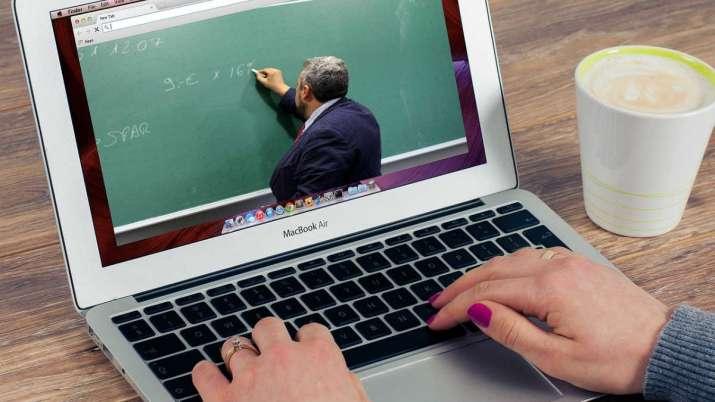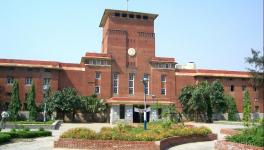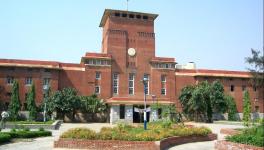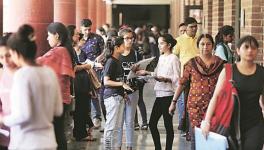Students, Teachers Voice Concerns Over Online Classes, Fee Hikes

Image Courtesy: India TV News
The push towards online learning in the midst of a pandemic – an “ill-thought-out” decision taken without bringing all the concerned stakeholders into confidence – has left students “helpless and depressed”, while reducing higher education to “a mere exercise of distributing degrees”. This is what students and teachers had to say in a virtual press conference, held on Tuesday, August 25, to highlight the issues currently ailing both the groups in the Indian universities.
The conference was attended mainly by students and teachers of varsities in Delhi, who flagged the pitfalls of online classes and conducting competitive exams in present times, and condemned the recent fee hikes by several colleges. The idea was to point towards the “sorry” state of affairs of higher education in the country by sharing the experiences of both the communities in the national capital, a hub of premier educational institutes which draws large number of students from different states.
In the wake of a COVID-19 induced lockdown, that had necessitated the shutting down of varsities since mid-March this year, digital teaching as a supplementary measure to it is being foisted by the college administrations, even as inadequate infrastructural support continues to mar the process, students and teachers said.
This has furthered the exclusion of many marginalised, economically weaker sections from the learning ecosystem, they added.
On July 6, the University Grants Commission revised its guidelines on examinations and the academic calender for universities, making final year examinations compulsory and extending the examination period till the end of September. The move has drawn flak from both teachers and students, however, the insistence on conducting exams by the university watchdog continues – even as surge in virus cases persists.
Reflecting upon how Jawaharlal Nehru University (JNU), a central varsity, responded to the lockdown-brought challenges, JNUSU president Aishe Ghosh flayed the administration’s move to switch to online mode for conducting mid-semester exams without taking into account the myriad problems that its diverse student community will have to face.
“Students come to JNU from Kashmir, where an ‘internet lockdown’ is in effect; there are students from Bihar, Assam, states which were recently inundated with floods; also, many students were required to stay at quarantine centres or there families were affected by COVID,” she said, adding that these realities, however, didn’t qualify to become a cause of worry for the JNU administration, which went ahead pushing for an online transition.
Also read: ‘Online Education, Exams Require Infra Development, Investment by Govt’
Ghosh also criticised the administration for its recent notification announcing online registration for next semester that above all, requires the students to clear the dues including hostel fees and maintenance charges.
Unnimaya, general secretary of the Lady Sri Ram College Students’ Union, while speaking about the perils of online learning pointed towards the complaints of students who are now having to face health problems due to increased screen time, that exceeds four to five hours each day.
For others, the poor internet connectivity still remains to be an issue, she added, demanding certain mechanisms for uploading of the videos that can be accessed by the students depending on their convenience.
The shutting down of the universities hasn’t only brought hardships to the students, but also to the many workers who are employed by the college administration.
Several cases of them being retrenched or facing pay cuts in different colleges have been reported, at a time when other job prospects looks sparse. A case in point in this regard being the Delhi University’s Ambedkar Ganguly hostel, where 19 sanitation workers were allegedly fired without any prior notice.
Amisha Nanda, a student of Law faculty, DU, who resides in the hostel said that while the fee payments of the students have not been waived, workers are being retrenched apparently due to shortage of funds.
Students from Guru Gobind Singh Indraprastha University, which is a Delhi state university and the National Institute of Fashion Technology (NIFT), which functions under the Union Ministry of Textiles, raised the issue of fees being charged by colleges that has not only caused stress to the students but to their families as well.
Also read: Education Amid Pandemic: Online Learning and Digital Divide
Nandita Narain, president, Delhi Teachers’ Federation (DTF), termed the push toward online teaching as a “business decision”, that is aimed to allow the big business groups to “profiteer” from this transition.
The only thing is that such a philosophy that directs education policies, “will only enhance and exacerbate the already prevailing social and economic divide” within the Indian society, according to her.
The online thrust has culminated into being formally presented as the recently approved National Education Policy, said Abha Dev Habib, treasurer, Delhi University Teachers’ Association (DUTA).
There is “an attack on the idea of the public-funded education and on the public universities,” she said, adding that this is all being done in an “undemocratic” manner without paying any heed to the concerns of teachers and students.
Get the latest reports & analysis with people's perspective on Protests, movements & deep analytical videos, discussions of the current affairs in your Telegram app. Subscribe to NewsClick's Telegram channel & get Real-Time updates on stories, as they get published on our website.
























